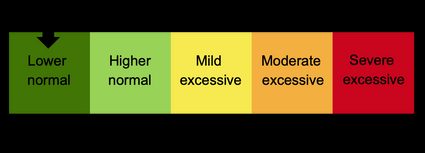Epworth Sleepiness Scale Calculator
The Epworth sleepiness scale calculator is a simple screening method for excessive daytime sleepiness and different sleep disorders, including sleep apnea.
Follow the article below to discover the interpretation of the Epworth sleepiness scale and its usage. We'll also talk about the most critical diseases & disorders that usually need evaluation with a sleep score. 😴
We try our best to make our Omni Calculators as precise and reliable as possible. However, this tool can never replace a professional doctor's assessment. If any health condition bothers you, consult a physician.
What is the Epworth sleepiness scale?
ESS as a medical abbreviation stands for the Epworth Sleepiness Scale. This method is an effortless and cheap way of evaluating how easy it is for you to fall asleep throughout the day. The ESS consists of 8 short questions that serve as a screening test that may be applied to the majority of the population over the age of 18.
The mentioned questions (enumerated below) allow us to discover whether our patient has an abnormal pattern of sleeping, caused either by a neurological, cardiological, or behavioral disorder. Sometimes, the reason for excessive sleepiness is pretty straightforward: the person is just staying up during the night. After we confirm that there indeed is a medical problem, we may proceed to more specific diagnostics methods. 🛏️
Excessive daytime sleepiness test is necessary, especially in groups of people that perform high-risk or high-responsibility jobs, such as a bus driver or a pilot. In these cases, even the slightest risk of falling asleep on duty should be carefully evaluated and eliminated — a few seconds of lost consciousness can cost lives.
Hey, remember that you can always screen for sleep apnea using the STOP-BANG calculator or check your perfect amount of sleep with our sleep cycle calculator.
💡 There's also a validated version of the Epworth score meant for children and young adolescents - ESS CHAD. The authors had to change questions that describe situations impossible to relate to children, such as drinking alcohol or driving a car. Compare it yourself — try the pediatric Epworth sleepiness scale calculator. 🍼
Which disorders may increase the ESS score?
Epworth scale is used for a general assessment of sleepiness problems; we still need to perform the diagnostic process that should lead us to the core of the issue. Remember — excessive doziness can be a sign of severe health problems!
Diseases and disorders that may cause excessive sleepiness during the day:
-
— a neurological disorder which symptoms include cataplexy (sudden loss of muscle control), excessive sleepiness and falling asleep in random places, hallucinations and sleep paralysis present when a person is waking up or falling asleep.
-
Sleep apnea — a disease usually caused by excessive weight and a large neck circumference. When a person affected by the disease is asleep, their muscles lose the tension, and the airways get blocked — the person's still breathing, but the air cannot get through, which results in a feeling of choking/snoring, and subsequent waking up. This situation may take place several times per hour(!). The patient is usually not aware of these little interruptions during the night's sleep, and the only clinical symptom is excessive sleepiness during the day.
The disease, if not treated, may lead to arterial hypertension or neurological and heart problems. 💔
-
Depression and other serious psychiatric diseases — excessive sleepiness might be a direct sign of ongoing psychiatric illness. Even up to 80% of people with depression have insomnia and an altered day-night cycle.
-
Restless legs syndrome — weird, painful feeling in legs that goes away with movement. Patients stay awake during the night because they can't stay still.
-
Diabetes
-
Parkinson's disease, multiple sclerosis, or other neurological disorders.
-
Asthma — signs and symptoms of asthma usually appear during the night, when falling asleep and waking up.
How to calculate the Epworth sleepiness scale
Epworth sleepiness scale scoring can take values from 0 to 24. The answer to each of the eight questions is worth 0, 1, 2, or 3 points.
What are the chances of you dozing/falling asleep when...
- You're sitting and reading? 📚
- You're watching TV? 📺
- You're sitting inactive in a public place, e.g., a meeting or a theatre? 🎭
- You're a passenger in a car after driving for more than one hour without any stop? 🚗
- You're lying down in the afternoon, in comfortable conditions? 🛋️
- You're sitting and talking to someone? 🗣️
- You're sitting quietly after lunch without alcohol? 🍕
- You're driving a car, and the traffic stops you for more than a few minutes? 🚦
Possible answer | |
|---|---|
I never do it | 0 points |
Slight chance (it rarely happens) | 1 point |
Moderate chance (it happens sometimes) | 2 points |
High chance (it happens very often) | 3 points |
The last step is to count up all the points gained from all the answers. Our Epworth sleep score calculator uses the following equation:
Epworth sleepiness score = Reading + Watching + Public place + Car passenger + Lying down + Talking + Lunch + Driving
